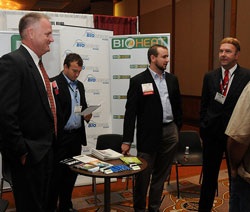 The use of biodiesel in heating oil … better known as bioheat … was part of the talk at the recent National Association of Farm Broadcasters’ meeting in Kansas City, MO.
The use of biodiesel in heating oil … better known as bioheat … was part of the talk at the recent National Association of Farm Broadcasters’ meeting in Kansas City, MO.
Our own Cindy Zimmerman caught up with two players in the bioheat business … one from the raw material end and the other on the consumer-distribution end … to get their takes on the emerging bioheat market and what the future holds for the green heating fuel.
Greg Anderson, a past chairman of the United Soybean Board (USB) and a grower from Nebraska, says putting biodiesel in heating oil was a natural extension of the soybean checkoff’s efforts to get more markets for soybeans and its co-products that first started with biodiesel replacing petroleum in vehicle engines. “We got to looking at the concept of, well, heating oil is a petroleum product and how about including biodiesel into heating oil applications?” He says now, bioheat is well-established on the East Coast. He adds that while most of the bioheat used now is a 2 percent blend, he expects that number could climb to 100 percent in the next 50 years. He says that would create a massive potential for biodiesel in just the heating oil market alone. “Right now, we’re looking at 7 billion gallons of heating oil just in the Northeast [U.S.].” And he says that could easily expand to western areas that also use heating oil.
Meanwhile, Don Allen of E.T. Lawson, a heating oil distributor from Virginia, says a few years ago, his 93-year-old company decided to get into the bioheat business. “This is our fourth year, we sell a 2 percent mixture to [more than] 7,000 homes, and couldn’t be happier.” Allen says his new bioheat business has been so successful he came to the Midwest to work with the National Biodiesel Board to get support for a bill in the U.S. Congress that would mandate a 2-5 percent mixture for the East Coast from Virginia to Maine. He adds that while logic would say there shouldn’t be any opposition, you never know with politicians. “I’m not a politician, so I can’t apply the ‘no-brainer’ or ‘brainer’ situation to Washington. There are obstacles to overcome politically, and we hope with the Congressional support we get from the American farmer in addition to the support we’ll engender back east, we’ll get it done.” Allen points out that his heating oil colleagues are under mandates to reduce greenhouse gas emissions, and bioheat is a perfect fit.
You can hear more of Cindy’s conversation about bioheat at NAFB Trade Talk here:Bioheat at NAFB Trade Talk

